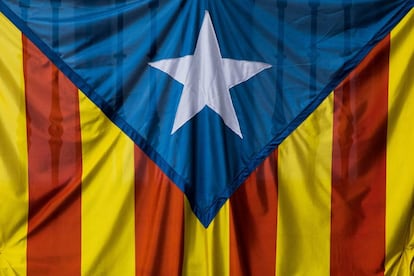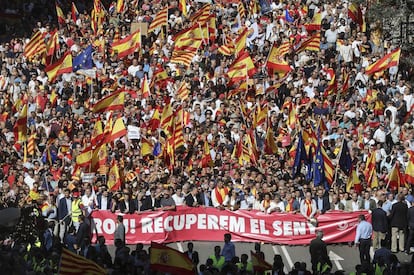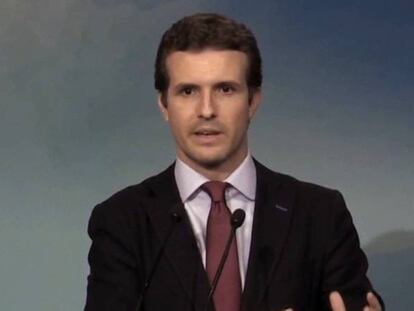Independence in Catalonia – now what?
The justice system had declared the referendum illegal

After a standoff that has now been going on for five years, the Catalan regional premier declared independence in a speech to the regional parliament, temporarily suspending its effects. It’s a moment to which those in favor of the separation of Catalonia from the rest of Spain want to give a historic solemnity. But no one should be fooled: that declaration has absolutely no validity. It is coming after a referendum that the justice system declared to be illegal and was carried out with no guarantees. It is preceded by a massive flight of companies and capital from Catalonia. And before today it has been received by an unshakeable rejection on the part of the opposition in Catalonia, all of the parties in Spain – whether on the left or the right – and the entire European Union.
Firstly, the Catalan premier will today declare independence in spite of the strong divisions that exist in Catalan society. He is doing so two days after a massive demonstration in Barcelona of Catalan and Spanish citizens against independence. Until Sunday, protests in Catalonia had belonged to the pro-independence sector, which since 2012, has brought together hundreds of thousands of people every September 11, Catalonia Day, to call for the breakup of Spain. But the supporters of the Spanish Constitution, which protects the unity of Spain, demonstrated a call for a return to common sense and for Catalan leaders to return to the law, something that they have refused to do.
That demonstration counted on the participation of the 2010 winner of the Nobel Prize for Literature Mario Vargas Llosa, who stated that the Catalan leaders are behaving like the “proponents of a coup,” and are acting in the name of a nationalism that has “filled history with wars, blood and bodies.”

Since the October 1 vote, Catalonia has been living through a situation of economic emergency. Nearly all of the major companies there have changed their legal headquarters to other cities in Spain, in the face of the instability that could be caused by a declaration of independence. For example, six of the seven Catalan companies that are listed on the Spanish stock exchange have left, including two of the country’s biggest banks, Caixabank and Sabadell. Two cava producers who are closely linked to Catalonia, Freixenet and Codorniú, are even thinking of going.
The basis for declaring independence is the referendum that was held on October 1. The justice system had declared it to be illegal and the police tried to stop it from going ahead, with charges against a number of voting points, causing injuries. The organizers changed the voting regulations 45 minutes before the polls opened, allowing anyone to vote wherever they wanted to. As there was no computerized voting census, there were people who were able to vote two or more times, given that the register was being kept on papers that were being filled out by hand.
Despite these irregularities, the pro-independence leaders published these results on October 6: 90.18% yes votes. If these figures were real, that would mean 2,044,038 Catalans, just 38% of the total census of those with the right to vote. All of the opposition to independence, from the left to the right, boycotted the referendum and refused to take part. A total of 7.52 million people live in Catalonia.
The current leader of the independence movement is Carles Puigdemont, who has been Catalan premier since 2015. Before then he was the mayor of Girona. His party, Junts pel Sí, ran at the last regional elections proposing the breakup of Spain, but failed to win a majority to form a government: 61 seats out of 135. He had to form an alliance with the least-voted party in the parliament, the radical left-wing CUP (10 seats), in order to push forward with his plans. Since that moment, the path toward independence has been rushed and has become radicalized.
The Spanish police intercepted on September 20 a document from a member of the Catalan government, Josep Maria Jové, with the steps to take to declare independence unilaterally, which was published by EL PAÍS. In it, he says that the pro-independence forces are seeking “a democratic conflict with wide citizen support, oriented toward generating political and economic instability that will force the [Spanish] state to accept the negotiation of the separation or a forced referendum.” This is the behavior of an anti-establishment party, not of the party of a government with responsibility for all Catalans, not just a section of society.
Meanwhile, all of the European leaders have criticized these plans, stressing that in the improbable case that Catalonia separates from Spain it would be left out of the European Union and the euro. The Spanish prime minister, Mariano Rajoy, has received the support of the heads of government in the United Kingdom, France and Germany, as well as the president of the European Commission, Jean Claude Juncker. All of them have stated that they will only have one interlocutor in this crisis: the Spanish government.
And what is the government of Spain planning to do? In an interview with EL PAÍS, Prime Minister Mariano Rajoy said on Saturday: “We are going to stop independence from happening. As such I can say to you with complete frankness that it is not going to happen. It is evident that we will take any of the decisions that the law allows us to in view of how events progress.”
The clearest option available to Rajoy is to apply Article 155 of the Constitution, which literally states that if a region does not obey the law, the government can adopt the necessary measures to force it to comply with those obligations. That’s to say: Rajoy could suspend the autonomy of Catalonia and, from the central government, take control of the entire region or part of it, something that would happen in the coming hours.
Since the vote on October 1, which was declared illegal by the Spanish justice system, the pro-independence forces have tried to make the Spanish government accept international mediation, something that would give its plans legitimacy: the Spanish and Catalan governments would then be on equal terms in the international sphere. For that reason, Rajoy has refused such mediation and has called on the pro-independence forces to return to the law.
At this stage of the crisis, and given all of these antecedents, there is consensus in Spain and in Europe that a declaration of independence would have no validity. There is no Catalan state, because it has no institutions or borders. It cannot collect taxes nor make investments. There is not nor will there be European governments that recognize it. What there is is a group of leaders who have continued with an independence plan without respecting the law and the feelings of the majority, something that has seriously affected the Catalan economy and that will now surely see the region lose more autonomy.
English version by Simon Hunter.
Tu suscripción se está usando en otro dispositivo
¿Quieres añadir otro usuario a tu suscripción?
Si continúas leyendo en este dispositivo, no se podrá leer en el otro.
FlechaTu suscripción se está usando en otro dispositivo y solo puedes acceder a EL PAÍS desde un dispositivo a la vez.
Si quieres compartir tu cuenta, cambia tu suscripción a la modalidad Premium, así podrás añadir otro usuario. Cada uno accederá con su propia cuenta de email, lo que os permitirá personalizar vuestra experiencia en EL PAÍS.
En el caso de no saber quién está usando tu cuenta, te recomendamos cambiar tu contraseña aquí.
Si decides continuar compartiendo tu cuenta, este mensaje se mostrará en tu dispositivo y en el de la otra persona que está usando tu cuenta de forma indefinida, afectando a tu experiencia de lectura. Puedes consultar aquí los términos y condiciones de la suscripción digital.










































